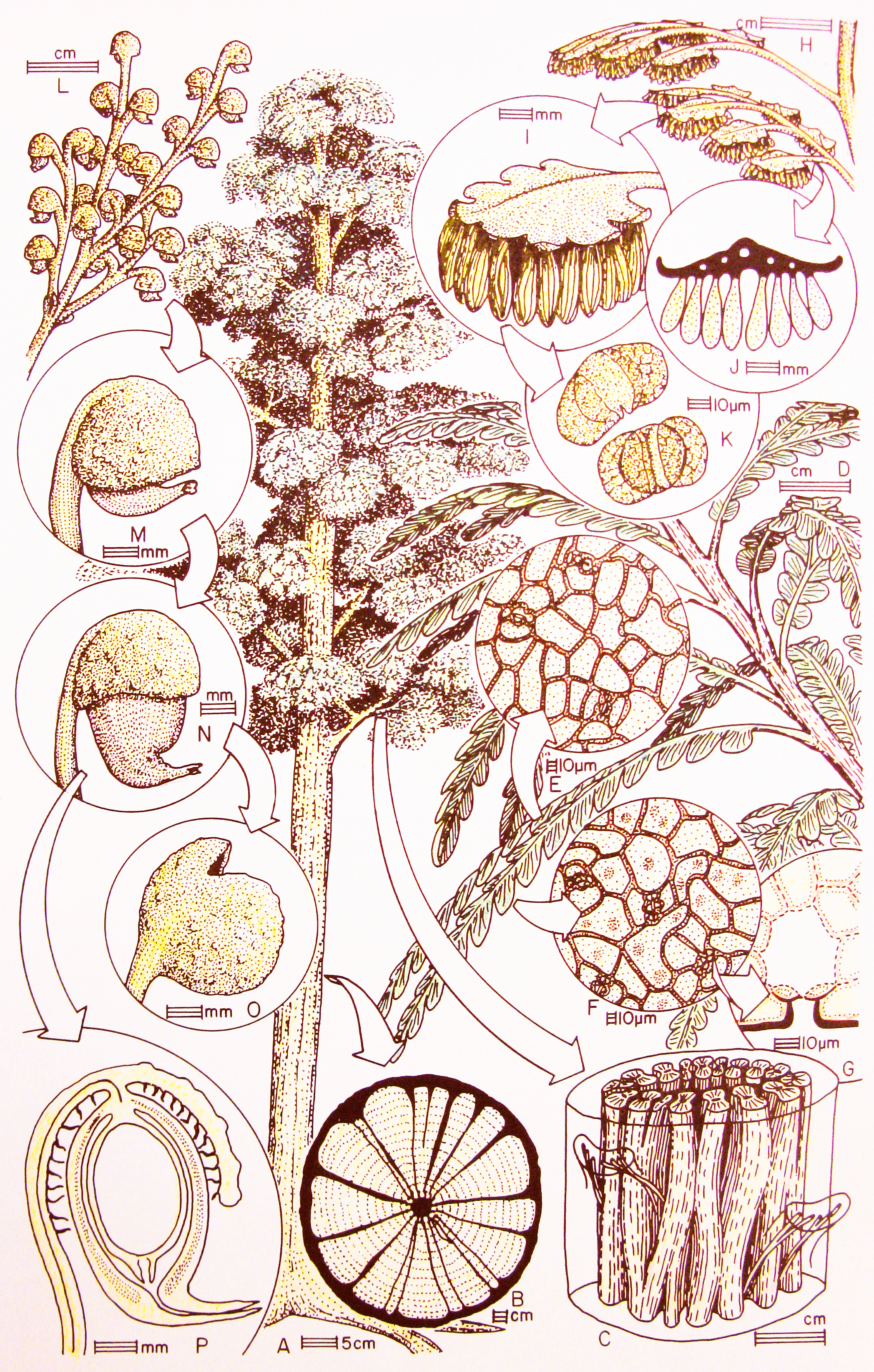Umkomasia Mongolica on:
[Wikipedia]
[Google]
[Amazon]
''Umkomasia'' is a 
genus
Genus (; : genera ) is a taxonomic rank above species and below family (taxonomy), family as used in the biological classification of extant taxon, living and fossil organisms as well as Virus classification#ICTV classification, viruses. In bino ...
of seed bearing organs produced by corystosperm
Corystosperms are a group of extinct seed plants (often referred to as "seed ferns") belonging to the family Corystospermaceae (also called Umkomasiaceae) assigned to the order Corystospermales or Umkomasiales. They were first described based on ...
seed ferns
Pteridospermatophyta, also called pteridosperms or seed ferns, are a polyphyletic grouping of extinct Spermatophyte, seed-producing plants. The earliest fossil evidence for plants of this type are the Lyginopteridales, lyginopterids of late Devon ...
, first based on fossils collected by Hamshaw Thomas from the Burnera Waterfall locality near the Umkomaas River of South Africa.
He recognized on the basis of cuticular similarities that the same plant produced pollen organs ''Pteruchus
''Pteruchus'' is a form genus for pollen organs of the seed fern (Pteridospermatophyta family Umkomasiaceae. It was first described by Hamshaw Thomas from the Umkomaas locality of South Africa. It is associated with the seed bearing organs ''Umk ...
'' and the leaves ''Dicroidium
''Dicroidium'' is an extinct genus of fork-leaved seed plants. It is the archetypal genus of the corystosperms, an extinct group of seed plants, often called " seed ferns", assigned to the order Corystospermales or Umkomasiales. Species of ''Dic ...
''. Various other corystosperm seed bearing organs from the Jurassic and Cretaceous have been assigned to this genus, but recently have been given distinct genera, with ''Umkomasia'' being restricted to the Triassic.

Description
Umkomasia has helmet like cupules aroundovules
In seed plants, the ovule is the structure that gives rise to and contains the female reproductive cells. It consists of three parts: the ''integument'', forming its outer layer, the ''nucellus'' (or remnant of the megasporangium), and the fe ...
born in complex large branching structures.
Whole plant associations
*''Umkomasia feistmantelii
''Umkomasia feistmantelii'' is an unusually large species of ''Umkomasia'' from the Early Triassic of New South Wales, Australia.
Description
''Umkomasia feistmantelii'' is found both with cupules enclosing the large seeds and with cupules ...
'' from the Early Triassic
The Triassic ( ; sometimes symbolized 🝈) is a geologic period and system which spans 50.5 million years from the end of the Permian Period 251.902 million years ago ( Mya), to the beginning of the Jurassic Period 201.4 Mya. The Triassic is t ...
of Australia
Australia, officially the Commonwealth of Australia, is a country comprising mainland Australia, the mainland of the Australia (continent), Australian continent, the island of Tasmania and list of islands of Australia, numerous smaller isl ...
may have been produced by the same plant as ''Pteruchus barrealensis
''Pteruchus barrealensis'' is an unusually large species of ''Pteruchus'' with very elongate polleniferous heads from Early Triassic of Australia and Argentina.
Description
''Pteruchus barrealensis'' is one of the geologically earliest species ...
'' (pollen organs) and ''Dicroidium zuberi
''Dicroidium zuberi'' is a large bipinnate species of the seed fern '' Dicroidium'' with a forked rachis. The leaves are affiliated with ''Umkomasia feistmantellii'' megasporophylls and ''Petruchus'' ''barrealensis'' microsporophylls.
''D. zu ...
'' (leaves)
*'' Umkomasia macleanii'' from the Late Triassic
The Triassic ( ; sometimes symbolized 🝈) is a geologic period and system which spans 50.5 million years from the end of the Permian Period 251.902 million years ago ( Mya), to the beginning of the Jurassic Period 201.4 Mya. The Triassic is t ...
of South Africa
South Africa, officially the Republic of South Africa (RSA), is the Southern Africa, southernmost country in Africa. Its Provinces of South Africa, nine provinces are bounded to the south by of coastline that stretches along the Atlantic O ...
may have been produced by the same plant as ''Pteruchus africanus
''Pteruchus africanus'' is a pollen organ of a seed fern (Pteridospermatophyta). It was first described by Hamshaw Thomas from the Umkomaas locality of South Africa.
Description
The pollen organs ''Pteruchus africanus'' differ from other spe ...
'' (pollen organs) and ''Dicroidium odontopteroides
''Dicroidium odontopteroides'' was a common and widespread species of '' Dicroidium'' known from South Africa, Australia, New Zealand, South America and Antarctica
Antarctica () is Earth's southernmost and least-populated continent. S ...
'' (leaves)
Reassigned species
* ''U.'' ''franconica'' Lower Jurassic, Germany, reassigned to the genus '' Kirchmuellia'' * ''U. asiatica'' Triassic, China reassigned to the genus '' Stenorachis'' * ''U. mongolica'' Lower Cretaceous, Mongolia, moved to the genus '' Doylea.''See also
*Evolution of plants
The evolution of plants has resulted in a wide range of complexity, from the earliest algal mats of unicellular archaeplastids evolved through endosymbiosis, through multicellular marine habitat, marine and freshwater green algae, to spore-beari ...
References
External links
* {{Taxonbar, from=Q25095279 Permian plants Triassic plants Prehistoric plant genera Pteridospermatophyta Permian first appearances Triassic extinctions